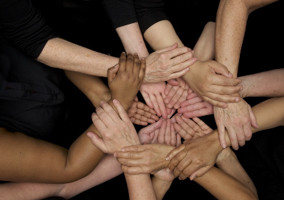I’m sure there will be very many white people reading the features in this month’s cover theme about structural racism in the charity sector who will bridle at the suggestion that they, or anyone else at their organisation, is racist. But I urge you to swallow your horror and your pride, and take in what the writers, and the speakers at last month’s Race to the Top event, are saying. This problem is not (always) personal – they are not suggesting that white people are all like Tommy Robinson, or harbour sympathies for the National Front. Institutional racism manifests as something much more covert and insidious – it’s not about individuals, it’s about how organisations work, how structures and policies and procedures are in place that favour one group over another, again and again, in a way that we don’t even notice, in a way that normalises it. The charity sector is not alone in having this problem – but it is certainly not exempt from it either. Many established charities are built on historical “white saviour” structures that perpetuate a paternalistic model of doing things to people, or for people, rather than with people.
The statistics on leadership speak for themselves. If 86 per cent of the UK population identify as white, is it an accident that well over 90 per cent, on average, of all the most senior roles in the charity sector are held by white people? Or is it the case that charities have been preserving the status quo of white privilege and power by recruiting from their closed networks and prioritising experience over skills, values, and potential?
Arguably even more important is the impact that structural racism has on the people that charities exist to help. This was what was so unsettling about the Citizens Advice training slide that was exposed by #CharitySoWhite last year. If the organisation views the customs and cultural norms of BAME communities as “barriers”, what kind of support will it deliver to those communities? It suggests an absence of empathy and understanding of difference.
#CharitySoWhite has called on charity leaders to make a public statement declaring that there is institutional racism in the sector, that they are part of the problem, and that they will work to root it out of their own organisations. Only a few brave souls have so far done this. But until white leaders in all sectors face up to this issue and take responsibility for changing it, we will continue to see discrimination affecting the life chances for BAME communities across criminal justice, education, housing, employment, health and social care – and our charities will not be fit to respond as effectively as they should.
Passing the baton
After four years as the sector’s agony uncle of this magazine, the erudite Andrew Hind has hung up his pen as he begins a new role on the trustee board at Oxfam GB. Oxfam’s gain is G&L’s loss, and I wish to express my heartfelt thanks to Andrew for his insightful contributions.
I also want to welcome Andrew’s successor as the back-page incumbent, experienced charity interim manager and trustee, Elizabeth Balgobin. In her new column, Interim measures, Elizabeth will tackle sector issues in a different format, but with no less competence and aplomb. Do send her your queries and topic ideas to @Balgobinthinks. We are delighted to have her on board.
Tania Mason
Related articles












